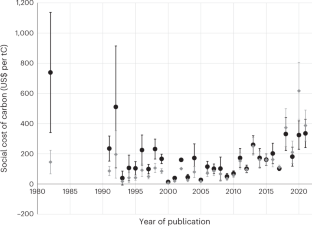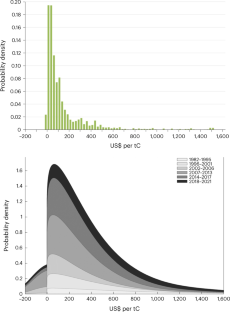Abstract
Estimates of the social cost of carbon are the yardstick for climate policy targets. However, there is great uncertainty and we do not know how estimates have evolved over time. Here I present a meta-analysis of published estimates showing that the social cost of carbon has increased as knowledge about climate change accumulates. Correcting for inflation and emission year and controlling for the discount rate, kernel density decomposition reveals a non-stationary distribution. In the past 10 years, estimates of the social cost of carbon have increased from US$9 per tCO2 to US$40 per tCO2 for a high discount rate and from US$122 per tCO2 to US$525 per tCO2 for a low discount rate. This trend is statistically significant if sensitivity analyses are discounted and paper quality weighted. Actual carbon prices are below its estimated value almost everywhere and should therefore go up.
This is a preview of subscription content, access via your institution
Access options
Access Nature and 54 other Nature Portfolio journals
Get Nature+, our best-value online-access subscription
$29.99 per month
cancel any time
Subscribe to this journal
Receive 12 print issues and online access
$209.00 per year
only $17.42 per issue
Rent or buy this article
Get just this article for as long as you need it
$39.95
Prices may be subject to local taxes which are calculated during checkout


Data availability
All data can be found in GitHub.Source data are provided with this paper.
Code availability
All code can be found in GitHub.
References
-
Nordhaus, W. D. How fast should we graze the global commons? Am. Econ. Rev. 72, 242–246 (1982).
-
Pigou, A. C. The Economics of Welfare (Macmillan, 1920).
-
Bator, F. M. The anatomy of market failure. Q. J. Econ. 72, 351–379 (1958).
-
Pareto, V. Manuale di Economia Politica con Una Introduzione Alla Scienza Sociale (Società Editrice Libraria, 1906).
-
Kaufman, N., Barron, A. R., Krawczyk, W., Marsters, P. & McJeon, H. A near-term to net zero alternative to the social cost of carbon for setting carbon prices. Nat. Clim. Change 10, 1010–1014 (2020).
-
Stern, N. H. & Stiglitz, J. E. The Social Cost of Carbon, Risk, Distribution, Market Failures: An Alternative Approach Working Paper 28472 (National Bureau of Economic Research, 2021).
-
Rennert, K. et al. Comprehensive evidence implies a higher social cost of CO2. Nature 610, 687–692 (2022).
-
Dietz, S. & Venmans, F. Cumulative carbon emissions and economic policy: in search of general principles. J. Environ. Econ. Manage. 96, 108–129 (2019).
-
NDC Synthesis Report (UNFCCC, 2021).
-
Biden, J. R. Executive Order on Protecting Public Health and the Environment and Restoring Science to Tackle the Climate Crisis (The White House, 2021).
-
Report on the Social Cost of Greenhouse Gases: Estimates Incorporating Recent Scientific Advances (EPA, 2022); https://www.epa.gov/system/files/documents/2022-11/epa_scghg_report_draft_0.pdf
-
Taconet, N., Guivarch, C. & Pottier, A. Social cost of carbon under stochastic tipping points. Environ. Resour. Econ. 78, 709–737 (2021).
-
van der Ploeg, F. & Withagen, C. Growth, renewables, and the optimal carbon tax. Int. Econ. Rev. 55, 283–311 (2014).
-
Anthoff, D. & Tol, R. S. J. The uncertainty about the social cost of carbon: a decomposition analysis using FUND. Clim. Change 117, 515–530 (2013).
-
Diaz, D. & Moore, F. Quantifying the economic risks of climate change. Nat. Clim. Change 7, 774–782 (2017).
-
Nordhaus, W. D. Evolution of modeling of the economics of global warming: changes in the DICE model, 1992–2017. Clim. Change 148, 623–640 (2018).
-
Hänsel, M. C. et al. Climate economics support for the UN climate targets. Nat. Clim. Change 10, 781–789 (2020).
-
Golosov, M., Hassler, J., Krusell, P. & Tsyvinski, A. Optimal taxes on fossil fuel in general equilibrium. Econometrica 82, 41–88 (2014).
-
van den Bremer, T. S. & van der Ploeg, F. The risk-adjusted carbon price. Am. Econ. Rev. 111, 2782–2810 (2021).
-
Havranek, T., Irsova, Z., Janda, K. & Zilberman, D. Selective reporting and the social cost of carbon. Energy Econ. 51, 394–406 (2015).
-
Wang, P., Deng, X., Zhou, H. & Yu, S. Estimates of the social cost of carbon: a review based on meta-analysis. J. Clean. Prod. 209, 1494–1507 (2019).
-
Tol, R. S. J. The marginal costs of greenhouse gas emissions. Energy J. 20, 61–81 (1999).
-
Roe, G. H. & Baker, M. B. Why is climate sensitivity so unpredictable? Science 318, 629–632 (2007).
-
Nordhaus, W. D. An optimal transition path for controlling greenhouse gases. Science 258, 1315–1319 (1992).
-
Anthoff, D., Tol, R. S. J. & Yohe, G. W. Risk aversion, time preference, and the social cost of carbon. Environ. Res. Lett. 4, 024002 (2009).
-
Weitzman, M. L. On modeling and interpreting the economics of catastrophic climate change. Rev. Econ. Stat. 91, 1–19 (2009).
-
Takezawa, K. Introduction to Nonparametric Regression (John Wiley and Sons, 2005).
-
Tol, R. S. J. The economic impacts of climate change. Rev. Environ. Econ. Policy 12, 4–25 (2018).
-
Altman, N. An introduction to kernel and nearest-neighbor nonparametric regression. Am. Stat. 46, 175–185 (1992).
-
Yu, K. & Jones, M. Local linear quantile regression. J. Am. Stat. Assoc. 93, 228–237 (1998).
-
Pearce, D. W. et al. in Climate Change 1995: Economic and Social Dimensions (eds Bruce, J. P. et al.) 179–224 (IPCC, Cambridge Univ. Press, 1996).
-
Smith, J. B. et al. in Climate Change 2001: Impacts, Adaptation, and Vulnerability (eds McCarthy, J. J. et al.) 913–967 (Cambridge Univ. Press, 2001).
-
Stern, N. H. et al. Stern Review: The Economics of Climate Change (HM Treasury, 2006).
-
Interagency Working Group on the Social Cost of Carbon. Technical Support Document: Technical Update of the Social Cost of Carbon for Regulatory Impact Analysis Under Executive Order 12866 (United States Government, 2013).
-
Nordhaus, W. D. Climate change: the ultimate challenge for economics. Am. Econ. Rev. 109, 1991–2014 (2019).
-
Quetelet, A. Lettres à S. A. R. le Duc Régnant de Saxe-Cobourget Gotha, sur la théorie des probabilités, appliquée aux sciences morales et politiques. (Hayez, 1846).
-
Pearson, K. On the criterion that a given system of deviations from the probable in the case of a correlated system of variables is such that it can be reasonably supposed to have arisen from random sampling. Lond. Edinb. Dubl. Phil. Mag. J. Sci. 50, 157–175 (1900).
-
Andrews, I. & Kasy, M. Identification of and correction for publication bias. Am. Econ. Rev. 109, 2766–2794 (2019).
-
Fisman, R., Jakiela, P., Kariv, S. & Markovits, D. The distributional preferences of an elite. Science 349, aab0096 (2015).
-
Drupp, M. A., Freeman, M. C., Groom, B. & Nesje, F. Discounting disentangled. Am. Econ. J. Econ. Policy 10, 109–134 (2018).
-
Tol, R. S. J. A meta-analysis of the total economic impact of climate change. Preprint at arXiv https://doi.org/10.48550/arXiv.2207.12199 (2022).
-
van den Bergh, J. C. J. M. & Botzen, W. J. W. A lower bound to the social cost of CO2 emissions. Nat. Clim. Change 4, 253–258 (2014).
-
Base the social cost of carbon on the science. Nature 541, 260 (2017).
-
Wagner, G. Recalculate the social cost of carbon. Nat. Clim. Change 11, 293–294 (2021).
-
Burke, M. et al. Opportunities for advances in climate change economics. Science 352, 292–293 (2016).
-
Marten, A. L. et al. Improving the assessment and valuation of climate change impacts for policy and regulatory analysis. Clim. Change 117, 433–438 (2013).
-
Valuing Climate Damages. Updating Estimation of the Social Cost of Carbon Dioxide (National Academies of Sciences, Engineering, and Medicine, 2017).
-
Wagner, G. et al. Eight priorities for calculating the social cost of carbon. Nature 590, 548–550 (2021).
-
Carbon Pricing Dashboard (The World Bank, 2021).
-
ICAP Allowance Price Explorer (International Carbon Action Partnership, 2021).
-
Jones, M. C. & Signorini, D. F. A comparison of higher-order bias kernel density estimators. J. Am. Stat. Assoc. 92, 1063–1073 (1997).
-
Quetelet, A. Sur quelques propriétés curieuses que présentent les résultats d’une serie d’observations, faites dans la vue de déterminer une constante, lorsque les chances de rencontrer des écarts en plus et en moins sont égales et indépendantés les unes des autres. Bull. Cl. Sci. Acad. R. Belg. 19, 303–317 (1852).
-
Pearson, K. III. Contributions to the mathematical theory of evolution. Phil. Trans. R. Soc. Lond. A 185, 71–110 (1894).
-
Laplace, P.-S. Essai Philosophique sur les Probabilités, 1st edn (Ve Courcier, 1814).
-
Makov, U. E. in International Encyclopedia of the Social and Behavioral Sciences (eds Smelser, N. J. & Baltes, P. B.) 9910–9915 (Pergamon, 2001).
-
McLachlan, G. & Peel, D. Finite Mixture Models (John Wiley and Sons, 2001).
Acknowledgements
P. Dolton, E. Lavoie and J. Stock provided constructive comments on earlier versions that made this paper much better. A number of authors gracefully shared their estimates of the social cost of carbon. No external funding supported this research.
Author information
Authors and Affiliations
Contributions
This is a single-authored paper. There are no ghostwriters and no research assistants.
Corresponding author
Correspondence to
Richard S. J. Tol.
Ethics declarations
Competing interests
The author declares no competing interests.
Peer review
Peer review information
Nature Climate Change thanks the anonymous reviewers for their contribution to the peer review of this work.
Additional information
Publisher’s note Springer Nature remains neutral with regard to jurisdictional claims in published maps and institutional affiliations.
Extended data
Extended Data Fig. 1 Year of emission and year of nominal dollar by year of publication.
Estimates are weighted such that every published paper counts equally.
Extended Data Fig. 3 Empirical median and interquartile range of the social cost of carbon for six subperiods and the whole sample, and for four alternative weights.
Extended Data Fig. 4 The pure rate of time preference used to estimate the social cost of carbon by publication period.
Estimates are weighted such that every published paper counts equally.
Extended Data Fig. 5 Year fixed effects from a regression of the social cost of carbon on the pure rate of time preference, using quality weights.
The base year is 1982; dots denoted the estimated coefficients; error bars denote the 67% confidence interval.
Supplementary information
Supplementary Information
Full list of references, Supplementary Tables 1–18, Supplementary Figs. 1–16 and a description of the assumptions and methods behind these tables and figures.
Source data
Source Data Fig. 1
Raw data, tables and figures; at https://github.com/rtol/metascc.
Source Data Fig. 2
Raw data, tables and figures (top); bespoke statistical software (bottom); at https://github.com/rtol/metascc.
Source Data Extended Data Fig. 1
Raw data, tables and figures.
Source Data Extended Data Fig. 2
Bespoke statistical software, at https://github.com/rtol/metascc.
Source Data Extended Data Fig. 3
Raw data, tables and figures.
Source Data Extended Data Fig. 4
Raw data, tables and figures.
Source Data Extended Data Fig. 5
Regression results from socialcostcarbon.do and socialcostcarbon.dta; at https://github.com/rtol/metascc.
Source Data Extended Data Fig. 6
Bespoke statistical software, at https://github.com/rtol/metascc.
Rights and permissions
Springer Nature or its licensor (e.g. a society or other partner) holds exclusive rights to this article under a publishing agreement with the author(s) or other rightsholder(s); author self-archiving of the accepted manuscript version of this article is solely governed by the terms of such publishing agreement and applicable law.
About this article
Cite this article
Tol, R.S.J. Social cost of carbon estimates have increased over time.
Nat. Clim. Chang. (2023). https://doi.org/10.1038/s41558-023-01680-x
-
Received: 03 August 2022
-
Accepted: 23 April 2023
-
Published: 15 May 2023
-
DOI: https://doi.org/10.1038/s41558-023-01680-x










